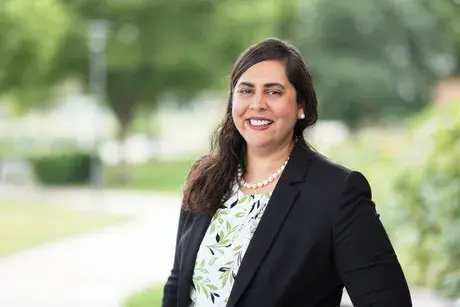No Outsiders in RWU Law Professor’s Classroom
Natasha Varyani shatters the unspoken rules of law school

One day a few years ago, Associate Professor of Law Natasha Varyani’ s property class was discussing a case about a homeowner on Martha’s Vineyard. A student raised her hand and asked, “Why are we reading all of these cases about these rich white people when there are things happening in the world?”
Varyani was taken aback by the question but realized that a lack of representation in legal textbooks reflects disparities in who has access to the courts, particularly the appellate courts that make the written decisions that appear in law books.
With a new book on systemic racism in property law, Varyani tackles the problem and helps other professors do the same. Released in 2024, “Owning Our Values: Understanding Systemic Racism Through the Lens of Property Law (And Skills to Do Something About It)” examines the way property law has impacted groups based on race, class, gender, and other characteristics.
.jpg)
According to Varyani, the book is the culmination of a decade of gathering cases about property issues from a different viewpoint than the traditional texts on the subject. She says she had heard from many professors that they would like to incorporate more diverse perspectives into their teaching but didn’t have the time to prepare the material or didn’t feel comfortable discussing viewpoints of a different identity group from their own. The book addresses these concerns. In addition to outlining the legal framework of property law, it also contains suggested skill exercises that students and professors can use for discussion.
“Otherness all around”
Varyani’s new book is a natural extension of a teaching career dedicated to helping students understand the language of law.
Varyani’s parents immigrated to the United States shortly before she was born. Before they moved, they were part of a Hindu minority in Muslim-majority Pakistan. Varyani’s extended family eventually moved to India. “There’s otherness all around,” she notes. As a first-generation child of immigrants, she sometimes felt the tension of being too South Asian to be a “real American” and too American to be South Asian.
Growing up in an immigrant household, Varyani was accustomed to helping her mother translate unfamiliar figures of speech. “I grew up thinking about how it came naturally to me to understand where people are, meet them, and get them where they need to be,” she says. “So the classroom was a place that I really loved, and I felt like I had a skill that was unique and valuable.”
Varyani has been a professor since 2012. She joined the RWU Law in the fall of 2023. When she was interviewing, she instantly felt connected to the school. With programs like its ongoing “Integrating Doctrine and Diversity” lecture series that explores how to bring diversity, equity, and inclusion into the classroom, RWU Law fits Varyani’s own teaching philosophy.
But when she began her teaching career, Varyani felt that otherness from her upbringing. In contrast to some of her colleagues who had taken a more traditional path from top tier law schools to judicial clerkships and teaching, she had worked in private practice as a tax lawyer for a decade and sometimes felt like she didn’t fit in academia. Over time, she learned to leverage her perspective to benefit students.
Tools to learn
"I think everyone's got a little bit of otherness in them, particularly when they come to law school," says Varyani. "I think it can be really scary. The way that law school is built is that it's different from any other educational experience you've had. Traditionally, it's easy for everyone to come into the classroom and feel scared, or like they're a fish out of water, or like there's a set of rules that everybody knows and they don't."
One of Varyani’s goals as a professor is to make students feel like they have the freedom to be curious in the classroom. She says, “I always want to give students the tools they need to learn in the classroom and to thrive outside.” And with her book, students and professors well beyond her classroom now have a new tool to understand the law.
